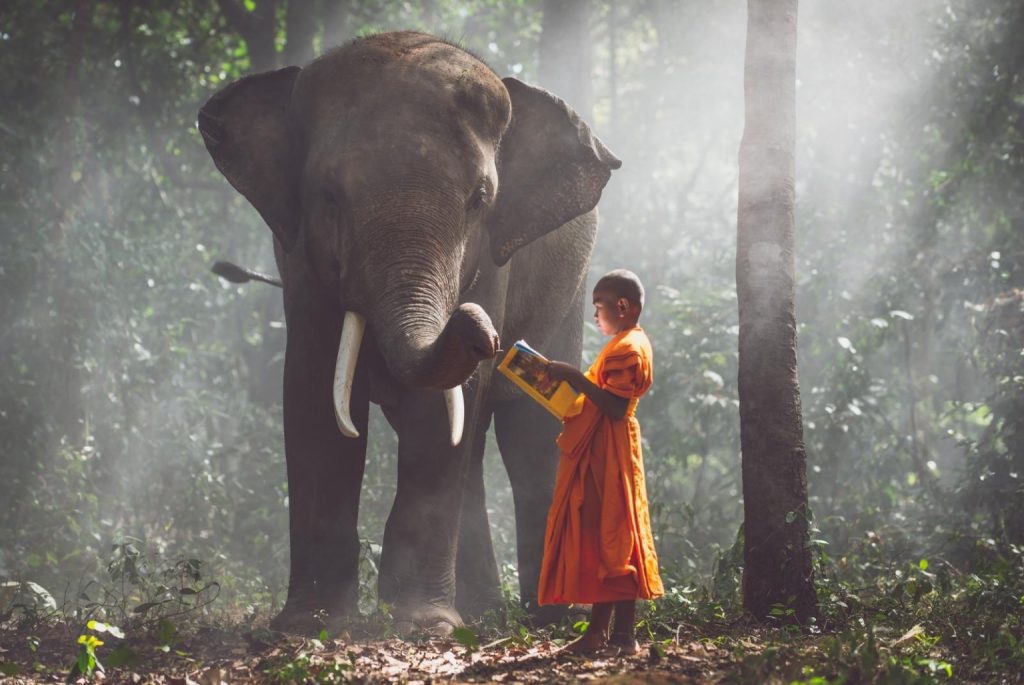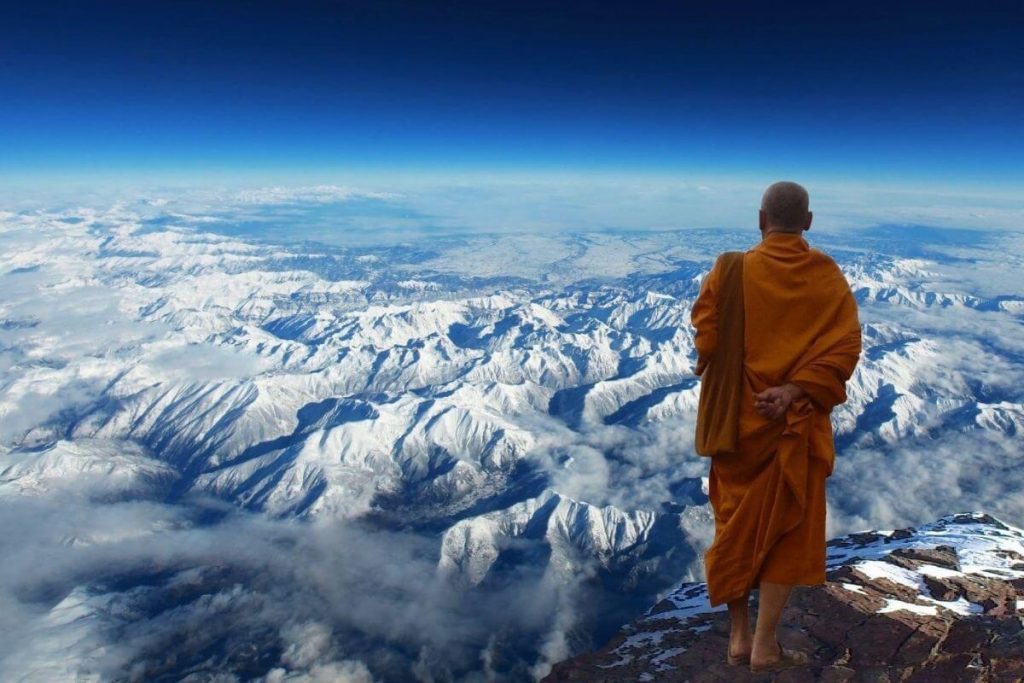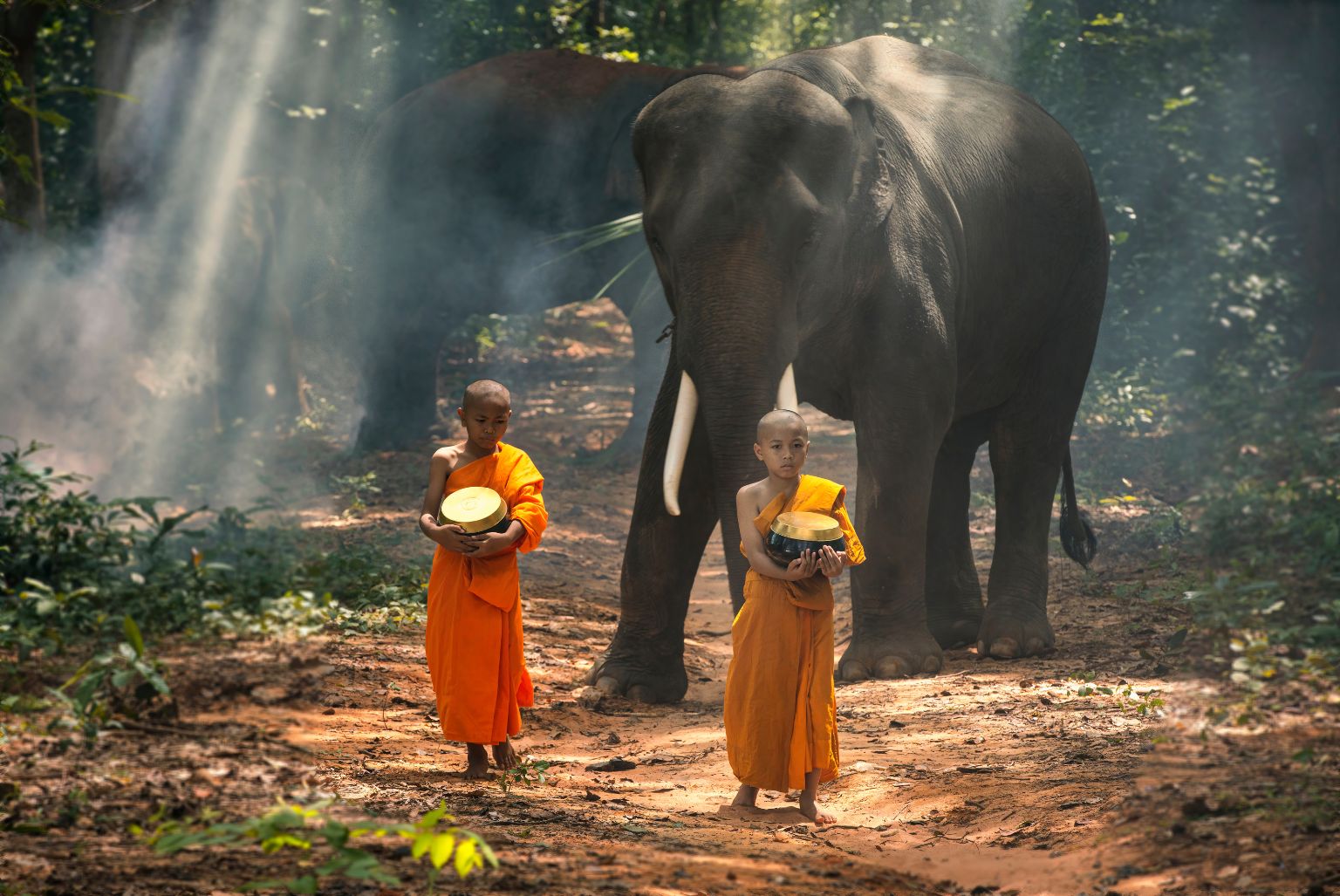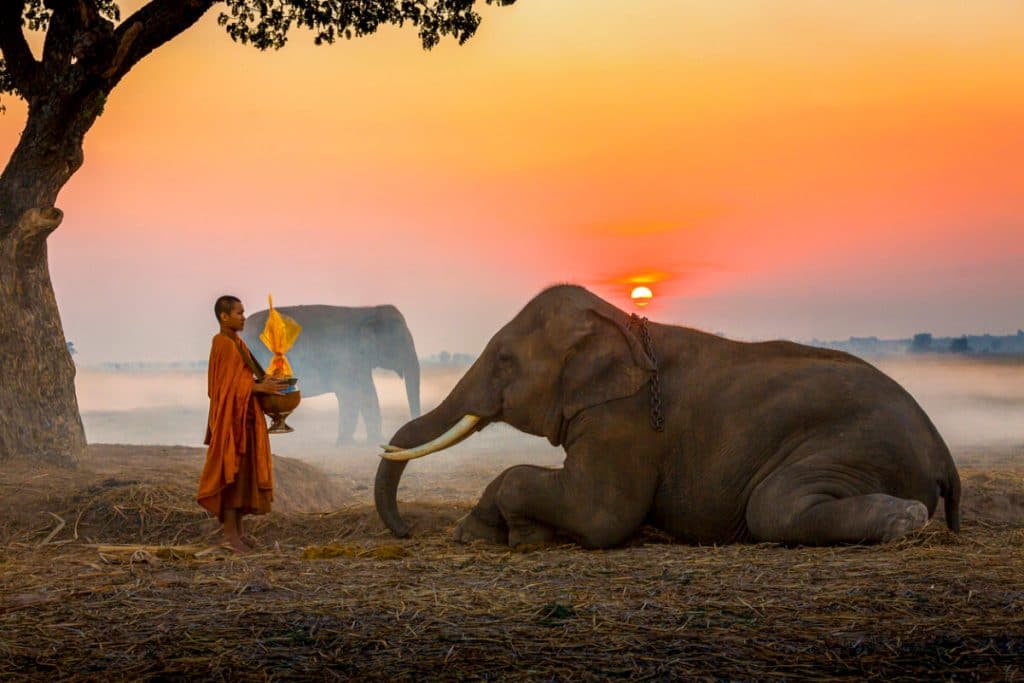“The first precept in Buddhism is “Do not kill.” This precept is not merely a legalistic prohibition, but a realization of our affinity with all who share the gift of life. A compassionate heart provides a firm ground for this precept.”
— Chatsumarn Kabilsingh Engaged Buddhist Reader
‘The Compass of Zen’
“All beings tremble before violence. All love life. All fear death. See yourself in others. Then whom can you hurt? What harm can you do?”
“One who, while himself seeking happiness oppresses with violence other beings who also desire happiness, will not attain happiness hereafter.”
“He, who injures living beings, is not Noble. He is called Noble, because he is gentle and kind towards all living beings.”
— Buddha
“Once we experience and feel this inter-dependence of all living beings, we will cease to hurt, humiliate, exploit and kill another. We will want to free all sentient beings from suffering. This is karuna, compassion, which in turn gives rise to the responsibility to create happiness and its causes for all.”
— Suresh Jindal ‘Interdependence of All Living Beings’
“Veganism is simply letting compassion guide our choice of food. As such, it is a basic Buddhist practice that ought to be expected of everyone who takes refuge vows.”
“When we hunt or fish, we deliberately kill a defenseless being who wishes us no harm. This is a direct violation of the First Precept. It is absolutely forbidden to Buddhists. As to eating meat, we know that the only way we can obtain it is for an animal to be killed. Therefore, when we eat meat, it is our intent that an innocent animal should die to satisfy our addiction to flesh. And that underlying intention, no matter how well hidden behind a smokescreen of rationalizations will block the growth of compassion and create negative karma.”
“Farm animals are not future Buddhas donating their flesh out of compassion for those of us who have developed a craving for it. They are victims of our greed from whom we steal the most precious gift any of us has: life.”
“It is a feeble compassion that pulls up short where self-interest begins.”
— Norm Phelps ‘The Great Compassion: Buddhism & Animal Rights’
“The Buddha’s teaching leads us to the realization that we must always strive to harm no sentient being, human or nonhuman, whether or not it is in our selfish interest to do so.”
“Buddhism cannot be true to itself until Buddhists resolve their ambivalence toward nonhuman animals and extend the full protection of their compassion to the most harmless and helpless of those who live at our mercy in the visible realms.”
“The beginning of mindful eating is the realization that eating meat is not about the meat-eater; it is about the animals who are tormented and killed.”
“When virtuous mental attitudes, like mindfulness, respect, and compassion, are invoked to justify nonvirtuous acts like hunting, fishing, and eating animal products, the mental attitudes are insincere. They are self-deceptions that we create to justify habits that in our hearts we know are wrong, but to which we have become attached.”
— Norm Phelps ‘The Great Compassion: Buddhism & Animal Rights’
“Usually when people look at the Buddhist precepts, they understand them in terms of human relationships ‘Do not kill. Do not steal. Do not lie.’ Of course these are about human relationships, but what do they mean in terms of the environment? There is a particular kind of stealing that we do when we clear-cut forests, when topsoil is washed into rivers. There is a particular kind of killing that we do when we wipe out whole species. These precepts are taught not only as they relate to humans but also how they relate to the environment, to the ten thousand things. Not only the sentient, feeling beings, deer, muskrat, beaver but to the rocks, trees and river. All of it.”
— John Daido Loori Roshi ‘Zen’s Radical Conservative’ Shambhala Sun, July 2001
“Although one can sympathize with a lay person trying to break their attachment to a diet featuring meat, it is something else again to extend those sympathies to monks, priests, and teachers. What business have these latter to propound the Dharma when they possess neither the perception nor compassion to see the connection between meat eating and the killing of harmless animals, and when they lack the self-discipline to put Buddhist compassion before the pleasure on their plates. What right have they to wear the Buddha’s robes when they won’t or can’t honor the bodhisattva vows they recite daily to liberate all beings?”
“Ultimately the case for shunning animal flesh does not rest on what the Buddha allegedly said or didn’t say. What it does rest on is our innate moral goodness, compassion, and pity which, when liberated, lead us to value all forms of life. It is obvious, then, that willfully to take life, or through the eating of meat indirectly to cause others to kill, runs counter to the deepest instincts of human beings.”
— Roshi Philip Kapleau ‘To Cherish All Life’
“Every individual who eats flesh food, whether an animal is killed expressely for him or not, is supporting the trade of slaughtering and contributing to the violent deaths of harmless animals.”
“To put the flesh of an animal into one’s belly makes one an accessory after the fact of its slaughter, simply because if cows, pigs, sheep, fowl, and fish, to mention the most common, were not eaten they would not be killed.”
— Roshi Philip Kapleau ‘To Cherish All Life’
“The eating of meat cannot in any way be considered to be helpful to the practice of the dharma, neither can the slaughter of animals be considered to be consistent with the Buddhist teachings of compassion (metta, ahimsa, and karuna), of loving kindness, or of the nature of the evocation of the enlightenment-mind. The cruelties associated with the slaughter of the animal kingdom for human consumption, the pain, fear, and distress suffered by the animals in the entire process of being fattened for butchering, as well as the environmental disasters wreaked upon our planet through the meat industry, are very well documented, and should be understood by all who claim to be developing bodhicitta, or who wish to.”
“Meat eating and a compassionate religion do not go hand in hand.”
“Rather than encouraging apathy through submissive responses, let us deliver the message loudly and clearly, that needless killing and suffering is wrong.”
“The perpetuators of the Buddha dharma have a moral responsibility to the rest of humanity to be at the forefront of the change away from blood-letting and killing, and not surreptitiously fostering it because of their lack of will to change their habits or mode of thinking concerning the animal kingdom.”
— Bodo Balsys Ahimsa ‘Buddhism and the Vegetarian Ideal’
“Thousands – millions and billions – of animals are killed for food. That is very sad. We human beings can live without meat, especially in our modern world. We have a great variety of vegetables and other supplementary foods, so we have the capacity and the responsibility to save billions of lives.”
“Killing animals for sport, for pleasure, for adventures, and for hides and furs is a phenomenon which is at once disgusting and distressing. There is no justification in indulging in such acts of brutality.”
— His Holiness the XIV Dalai Lama

“Being a vegetarian makes it easier for us to increase our loving kindness and compassion.”
— Zen Master Thich Thanh Tu ‘Udumbara Flowers, Book II’
“In his final teachings before he physically left this earth, the Buddha foresaw that a situation would arise in the future where those speaking in his name would pervert his Doctrine and encourage meat consumption. So here, in this great Nirvana Sutra, he lays down his last will and testament on the matter: in no circumstances should one eat meat or fish ” nor animal corpses, found in the jungle, for instance ” nor even accept from a donor a meal which contains an abundance of flesh-foods. The very contact of other food with meat is deemed defiling and requires purification of the food by water. It is quite evident from all this that the Buddha in no way condoned the eating of meat and was keen for his monastic and lay followers to abjure the uncompassionate practice of meat eating and follow the pure path of vegetarian Mahayana. In this, we would be wise and benevolent to follow him.”
— Dr. Tony Page ‘Buddha – Self: The “Secret” Teachings of the Buddha in the Mahaparinirvana Sutra, Vol. 2’
“When we bring mindfulness to the dinner table, it suffuses the rest of our life as well. We become more sensitive to the well-being of animals, of the environment, and of ourselves and our families. We are more aware of the choices we make in all areas of our life. We enjoy food more, know that, while the obtaining of even plant foods necessitates some suffering, the amount and kind of suffering is dramatically reduced when we leave meat off our shopping lists and out of our kitchens. We become more aware of how meat consumption feeds violence and anger.”
— Kate Lawrence ‘Mindfulness in the Marketplace: Compassionate Responses to Consumerism’
“There are three ways of killing that we, as Buddhists, have to restrain: either by directly killing, indirectly killing, or rejoicing to see others be killed. Not only does this apply to human life, it should be also extended to all living beings.”
— Zen Master Thich Thanh Tu ‘Buddhism for Beginners’
“We can do no greater harm that to kill another sentient being. Killing is the ultimate expression if indifference to the well-being of others. All, except in the most extreme circumstances, cherish life. In the contemporary hell of the modern slaughterhouse animals cry out and cower in terror when they realize that their life is nearing a premature end. All beings, except in the most desperate circumstances, try to escape death.”
— Bodhipaksa ‘Vegetarianism’
“The eating of meat extinguishes the seed of great compassion.”
— The Buddha ‘Mahaparinirvana Sutra’
“I do not see any reason why animals should be slaughtered to serve as human diet when there are so many substitutes. After all, man can live without meat.”
— HH The 14th Dalai Lama
“One is not a great one because one defeats or harms other living beings. One is so called because one refrains from defeating or harming other living beings.”
— The Buddha Dhammapada, Ch. 19 (15/270), Max Muller, Trans
“The Buddha said time and time again in the sutras such things as: “My followers should give up all evil actions that directly or indirectly injure others.” One may disregard his words; one may consciously lead others to commit evil in provisioning oneself with meat. One may think, “There are always skillful means in the sutras and tantras that counteract the evil so that I shall still be pure of stain.” And one can let oneself off the hook by telling oneself that there are substances to be placed into the animals’ mouths and words that can be whispered in their ears and impressed upon their minds so that they will not remain in the lower realms. But to do all this reveals a complete failure to grasp the meaning of the Buddha’s teaching. It is a perversion of the Dharma.”
“If there is no meat eater, there will be no animal killer”
“When we have acquired an awareness of the fact that all beings have been our mothers, and when this awareness is constant, the result will be that when we see meat, we will be conscious of the fact that it is the flesh of our own mothers. And, far from putting it in our mouths and eating it, we will be unable to even take it into our hands or smell its odor.”
“Sincere practitioners feel a natural, visceral compassion for the goats and sheep as if they were their old mothers. They will have nothing to do with killing them for the sake of meat. On the contrary, they save life eagerly; they ransom animals set aside for slaughter and release them. Otherwise, it is like trying to punch someone who isn’t there. Showing compassion for animals after they have been killed and the meat is being eaten, reciting mantras for the animal’s sake is nothing but a silly game.”
“One of the greatest obstacles to the birth of bodhichitta in our minds is our craving for meat.”
— Shabkar Tsogdruk Rangdrol ‘Food of Bodhisattvas: Buddhist Teachings on Abstaining from Meat’

“Buddhism teaches the doctrine of karma, which is the law of cause and effect relating to our actions. Karma means that whatever one sows, one reaps, be it good or evil. The consequences of meritorious acts are always good. Evil acts, on the other hand, ensure painful retribution. Buddhists are aware that we are constantly creating new karma by our actions. One who believes in the law of causation, therefore, will be careful not to cause pain to people, animals, plants, or the earth itself, for harming them is simultaneously harming oneself.”
“A person of the deepest spirituality will also have a tender concern for every aspect of creation. Such an individual could no more harm a living creature than he or she could harm himself or herself. Buddhist scriptures contend that a bodhisattva will not even walk on grass lest it be harmed. Indeed, the first Buddhist precept is the admonition not to kill, but to cherish all life. This attitude is especially important with respect to food, since anything we eat must die to sustain us. Still, it is less destructive, on a relative level, to take the life of a carrot or an apple than to take that of a more highly evolved form of life, such as a cow, a chicken, or a lobster. Too, from a purely ecological point of view, it is less detrimental to the environment to eat as low as possible on the food chain. All this explains why many Buddhists are vegetarians.”
“Perhaps it is part of being human to question who and what we are. Unfortunately, because we rely almost exclusively on our senses, the harder we look, the more we misinterpret what we see. We believe on the one hand that we are an insignificant dot in the universe, separate from all other humans, much less the natural world. But we also believe that we are the most highly evolved organism in creation, entitled to use whatever we can grasp for our own ends.” Buddhists have a different view of humanity. In terms of their psycho-spiritual development people stand about midway between Buddhas and amoebas. However, on an absolute level, people, Buddhas, amoebas, dogs, streams, and mountains are one and the same. Buddhism addresses the apparent disparity between what we see and what we actually are. And it does so by delving into the roots of what it means to be human.”
— Ven. Sunyana Graef ‘The Foundations of Ecology in Zen Buddhism’
“Aware of the suffering caused by the destruction of life, I am committed to cultivating compassion and learning ways to protect the lives of people, animals, plants, and minerals. I am determined not to kill, not to let others kill, and not to support any act of killing in the world, in my thinking, and in my way of life.”
— ‘The First Mindfulness Training’ Thich Nhat Hanh ‘The Heart of Buddha’s Teaching’
“Buddhism teaches us that all our suffering issues from our desires. A desirous mind state generates harmfulness in all its forms, both toward others, and toward ourselves. As has been witnessed throughout the millennia in both monastic and strong lay practice in several traditions, when one goes without meat or fish, one may well find oneself released from the desire for these foods (although not instantly, of course) and one may even “soften” to the suffering of all creatures through a closer identity with them. Vegetarianism can be an aid to learning to live a life of actions taken outside the realm of doing harm. It is hard to say, in fact, which may come first, and which way the cycle may spiral ” non meat eating leading to sympathy for the plight of animals, or growing sympathy arising from deep and dedicated spiritual practice leading to a gathering unwillingness to cause harm by supporting animal slaughter. But it becomes clear, along the road to vegetarianism, that the less meat one desires, the closer one feels toward all life, the more harmless one feels, and the more aware of the suffering of the helpless beasts one is. If, and possibly only if, vegetarianism is supported by involved and sincere spiritual practice, it serves to soften us up. It actually (forgive me) tenderizes us.”
— Sensei Sevan Ross ‘Vegetarianism and Zen Practice’
“People who eat meat often make the excuse that it is natural to do so, that people were meant to eat meat. They promote this idea, and then freely indulge in taking the lives of their fellow creatures, thereby creating extensive hatred and enmity-karma.”
— Great Master Lianchi Zhuhung On Stopping Killing!
“Buddhism regards all living creatures as being endowed with the Buddha nature and the potential to become Buddhas. That’s why Buddhism teaches us to refrain from killing and to liberate creatures instead.”
— Venerable Master Hsuan Hua ‘Liberating Life’
“These days many voices proclaim the sanctity of human life. Human life should of course be valued highly, but at the same time the lives of other living beings should also be treasured. Human beings snatch away the lives of other creatures whenever it suits their purposes. The way of thinking that encourages this behavior arises from a specifically human brand of violence that defiles the self-evident laws of the universe, opposes the growth of the myriad things in nature, and destroys feelings of compassion and reverence arising from our Buddha-nature. In view of such needless destruction of life, it is essential that laymen and monks together conscientiously uphold this precept.”
— Hakuun Yasutani-roshi on the Precept of Non-Harm As quoted in ‘To Cherish All Life’
“For innumerable reasons, Mahamati, the Bodhisattva, whose nature is compassion, is not to eat any meat.”
“For fear of causing terror to living beings, Mahamati, let the Bodhisattva who is disciplining himself to attain compassion, refrain from eating flesh.”
“Meat is not agreeable to the wise: it has a nauseating odor, it causes a bad reputation, it is food for the carnivorous; I say this, Mahamati, it is not to be eaten.”
“From eating meat arrogance is born, from arrogance erroneous imaginations issue, and from imagination is born greed; and for this reason refrain from eating meat.”
“Meat-eating is condemned by the Buddhas, Bodhisattvas, and Sravakas; if one devours meat out of shamelessness he will always be devoid of sense.”
“Therefore, do not eat meat which will cause terror among people, because it hinders the truth of emancipation; not to eat meat: this is the mark of the wise.”
— Sayings of the Buddha from the ‘Lankavatara Sutra’

“If a man can control his body and mind and thereby refrains from eating animal flesh and wearing animal products, I say he will really be liberated.”
— The Buddha the ‘Surangama Sutra’
“It is sad to see how many American Buddhists are managing to find a self-satisfying accommodation to eating meat. Some airily cite the doctrine of Emptiness, insisting that ultimately there is no killing and no sentient being being killed. Others find cover behind the excuse that taking life is the natural order of things and, after all, “the life of a carrot and that of a cow are equal.” The truth is, though, that as humans we are endowed with discriminating minds that we can use to educate ourselves to the implications of our volitional acts and to choose those foods that minimize suffering to living beings.”
— Bodhin Kjolhede ‘A Debate on Food and Practice’ Tricycle, Winter 1994
“Kill and eat is not a Buddhist principle.”
— Senaka Weeraratna From ‘Export of Meat Products from Sri Lanka Harms Country’s Buddhist Image’ Buddhist News Network.
“An understanding and acceptance of the theory of evolution is important because without that acceptance there is a perception of a great separation between humans and animals which simply is not true.”
— David N. Snyder, Ph.D. ‘Right Understanding’
“Human beings also kill animals not just for food. They take the animal’s skin to make shoes and hats and clothes. And even that is not enough. They take these animal’s bones to make necklaces or buttons or earrings. In short, they kill many, many animals in order to sell the animal parts for money. Because of these desires and this strong animal consciousness, human beings fight with each other, and destroy nature. They do not value life. So now this whole world has many problems; problems with the water, problems with the air, problems with the earth and food. Many new problems appear every day. These problems do not happen by accident. Human beings make each and every one of these problems. Dogs, cats, or lions, or snakes – no animal makes as many problems for this world as human beings do. Humans do not understand their true nature, so they use their thinking and desire to create so much suffering for this world. That is why some people say that human beings are the number one bad animal in this world. So human beings must soon wake up and find their original seeds, their original nature.”
— Zen Master Seung Sahn
“As a Buddhist, we practice so as to benefit self and others hence we do the six-syllable mantra practice. However, when we eat meat be it chicken, pork, fish or eggs in our daily lives, we are creating immense negative karma. If on the one hand, we chant the mantra and on the other hand, we eat the meat of mother sentient beings, then our words and actions do not tally with one another. We are not doing as we preach. Can this be considered as loving kindness and compassion towards sentient beings? Is this doing good and abstaining from evil? We take refuge in the Buddha because his teachings could benefit all sentient beings. As a Buddhist, we should understand the essence of the Buddha’s wisdom and teachings, which is to do good and abstain from committing evil deeds. Abstaining from evil means that we have to keep our precepts. Hence we should not take meat. When we are sick, old or near death, we would go to the doctor, we would practice and do anything possible to extend our lifespan. However, when we take meat, we are killing sentient beings that are healthy. How great is our compassion and loving kindness if we treat sentient beings in such a manner? We should abstain from killing because it generates immense negative karma. Instead, we should develop loving kindness and compassion towards all sentient beings.”
“In countless rebirth, all sentient beings have been our parents. When we took rebirth in the human realm, we had human parents; when we took rebirth in the animal realm, we had animal parents and so forth. Samsara is such. We need to generate a sense of gratitude towards our parents in this lifetime and those of our past lives. Hence, we should be vegetarians and abstain from taking meat. In such a way, we would do good and give meaning to our practice. By doing so, our practice of the six-syllable mantra would be able to benefit ourselves and others, and also aid in the flourishing of the Dharma. There are some people who say that their doctor has advised them against becoming vegetarians, as they would suffer from malnutrition. This is a sign that the determination of these people is not strong enough. For if one has strong determination, one would avoid doing evil deeds at all costs and under any circumstances. Hence in our daily lives, we should stop committing the negative deed of eating meat. On this basis, the merits generated from our refuge and practice of the six-syllable mantra would be inconceivable. We should try to change our lifestyle towards vegetarianism. We would certainly face difficulties in becoming full vegetarians. However, when such obstacles arise, we should remember how every sentient being had at one point or another been our parents. When we remember this, then we would not take meat just as we would not eat the meat of our parents of this lifetime.”
— His Eminence Druwang Konchok Norbu Rinpoche ‘100 Million Six-Syllable Mantra’ Retreat
“To feel overflowing love and almost unbearable compassion for all living creatures is the best way to fulfill the wishes of all the Buddhas and Bodhisattvas. Even if for the moment you cannot actually help a sentient being in an external way, meditate on love and compassion constantly over the months and years until compassion is knit inseparably into the very fabric of your mind.”
— H.H. Dilgo Khyentse Rinpoche
“We should contemplate the Mahayana teachings and the precious teachings of the Kagyus. The earlier Kagyu masters gave up meat, took up a vegetarian diet, and developed pure love for sentient beings. If we ourselves can take up even the smallest aspect of this sort of action and start with something small, it will turn out extremely well, I think.”
— 17th Karmapa, Ogyen Trinley Dorje
More Quotes









Sugar-Free Ginger & Lemon Immune Booster Shot Recipe
Read More →Daily Routine: The Probiotic That is Created Especially For Women
Read More →Blueberry Almond Oat Milk & Overnight Oats Recipe for Your Milky Plant
Read More →How Gisela Survived The Dairy Farm
Read More →Sugar-Free Ginger & Lemon Immune Booster Shot Recipe
Read More →Daily Routine: The Probiotic That is Created Especially For Women
Read More →Blueberry Almond Oat Milk & Overnight Oats Recipe for Your Milky Plant
Read More →